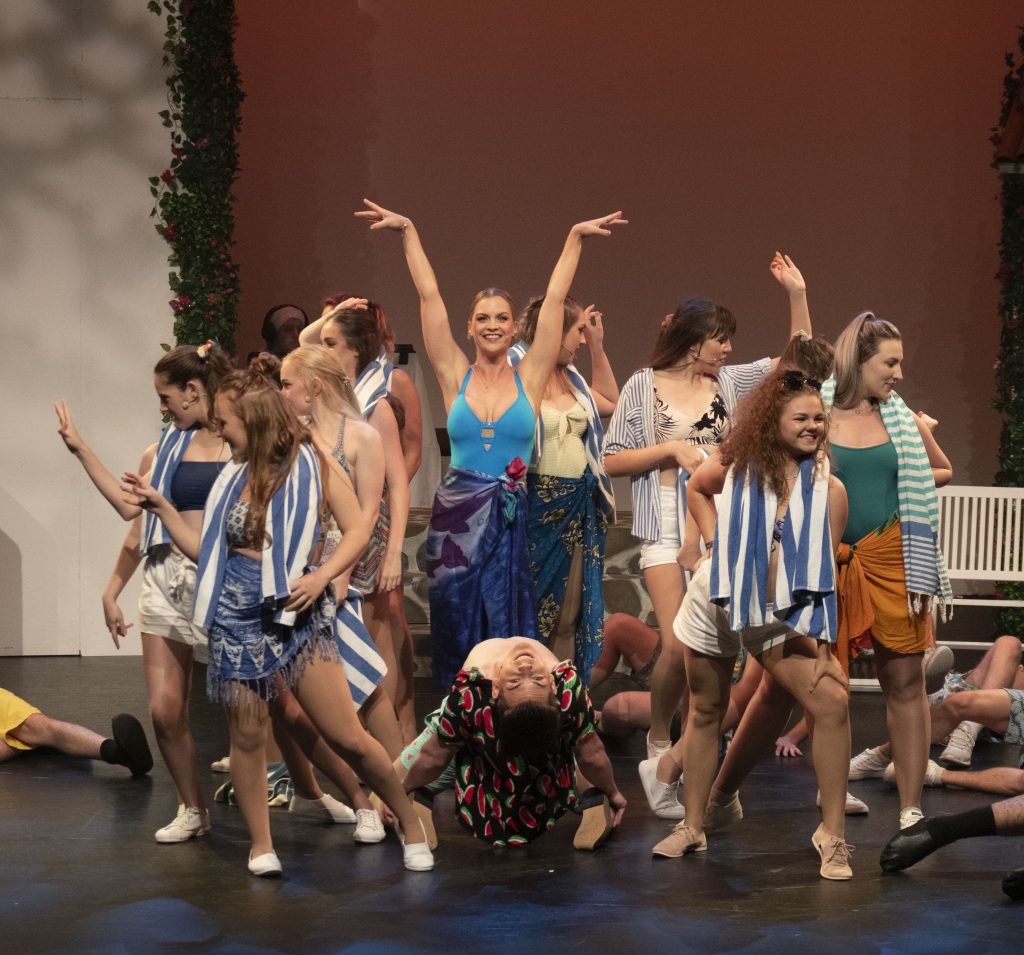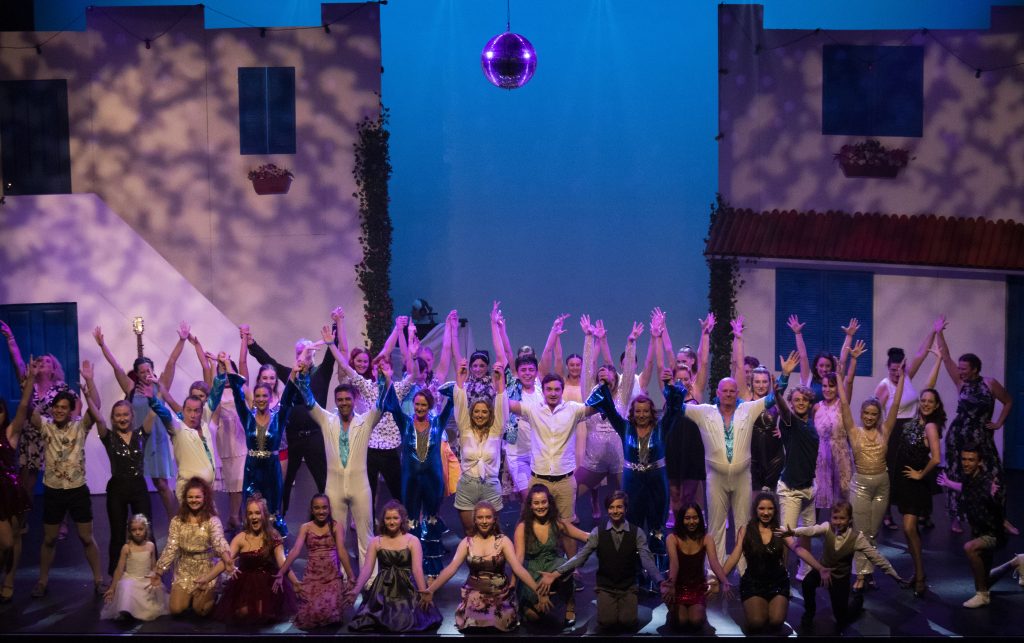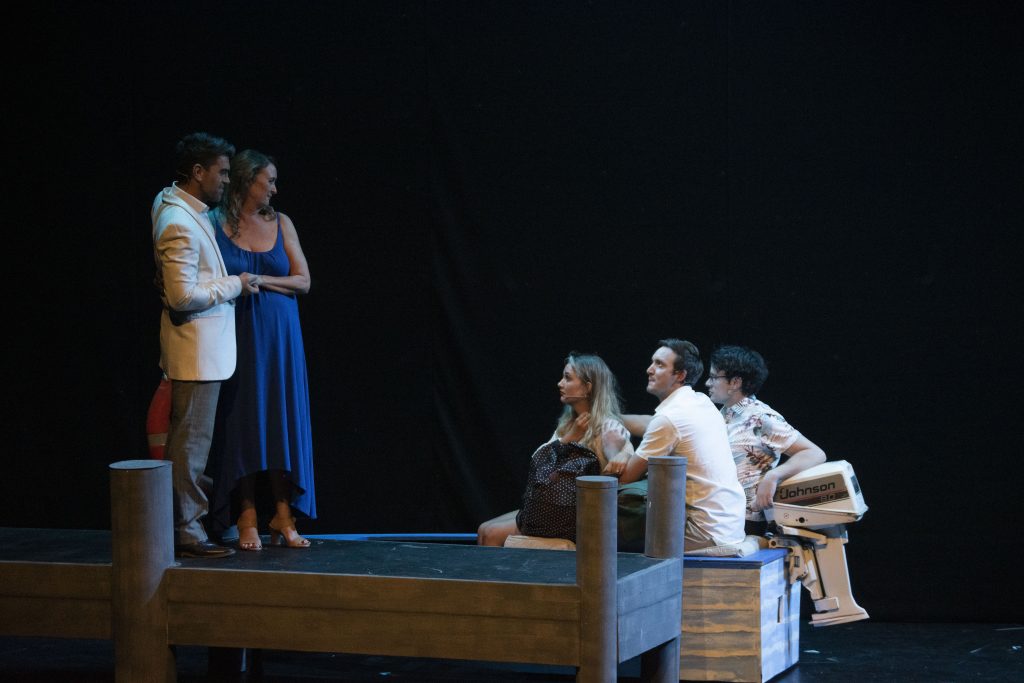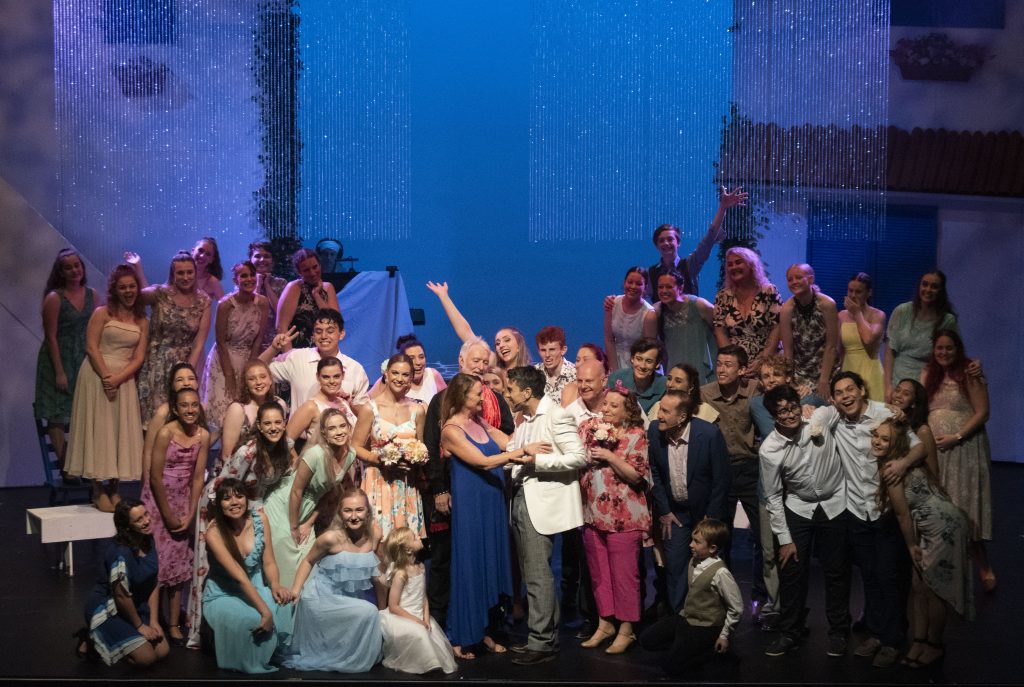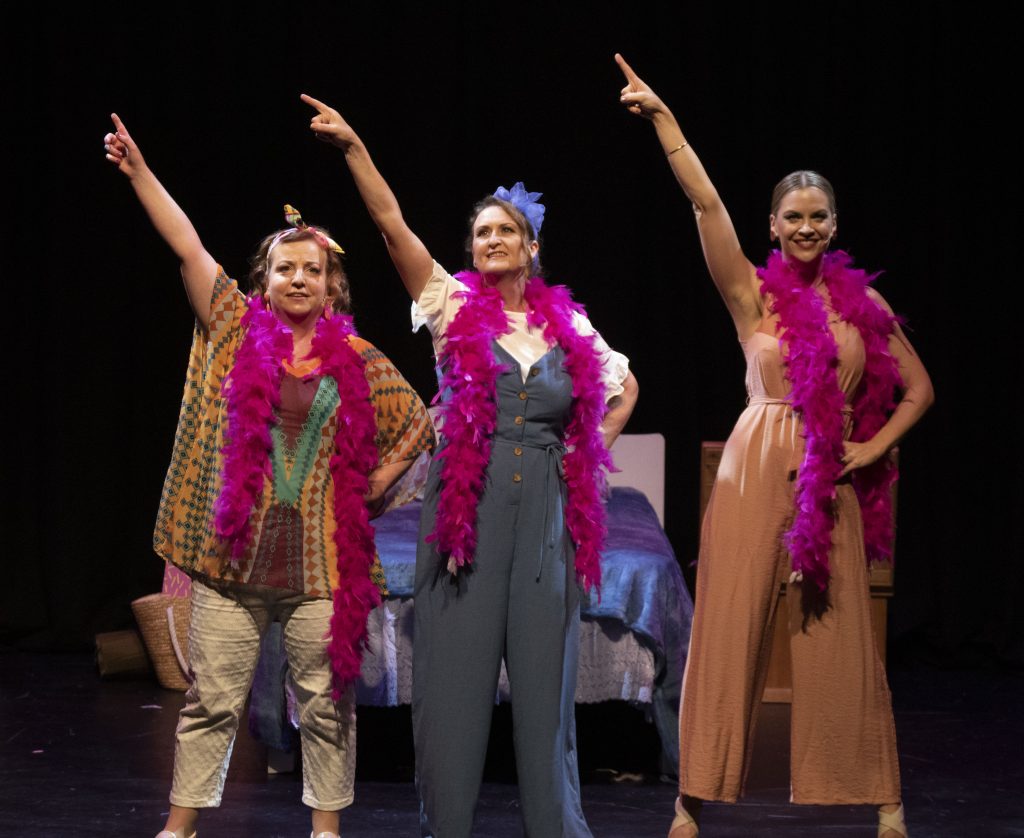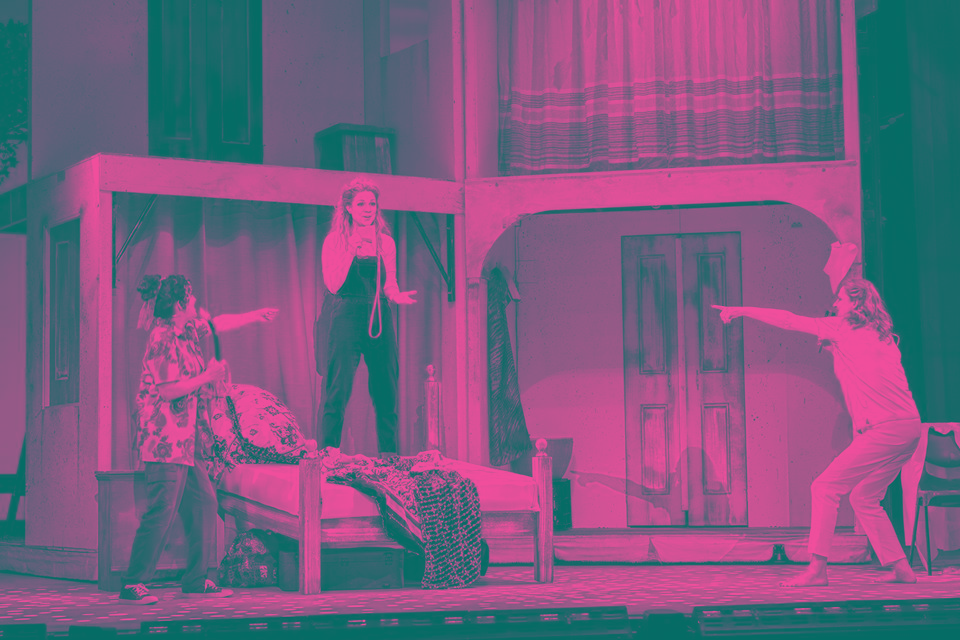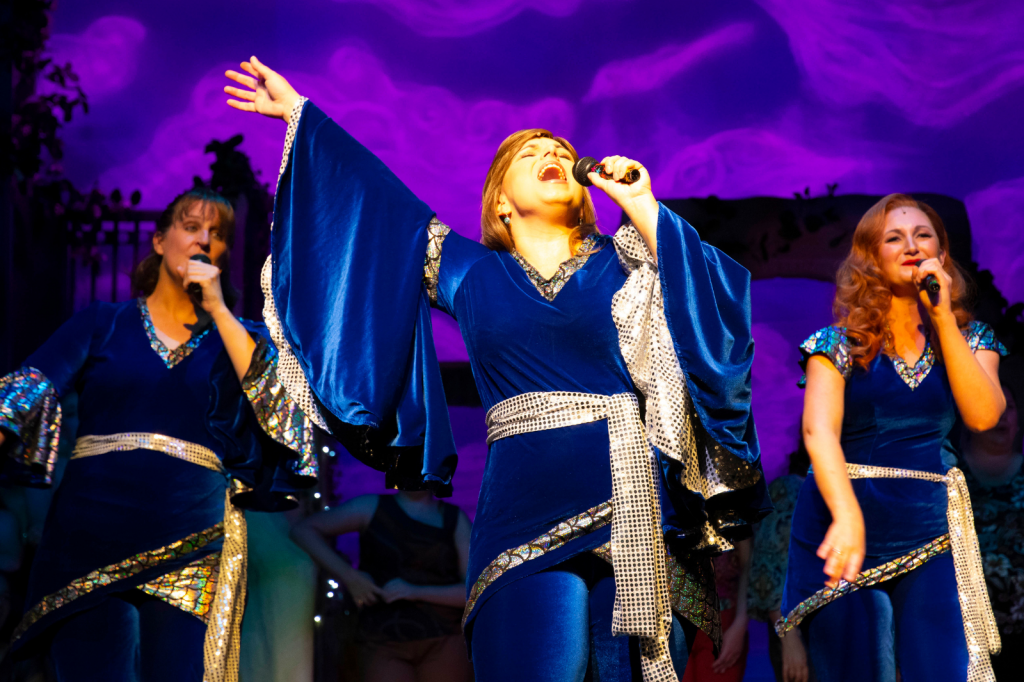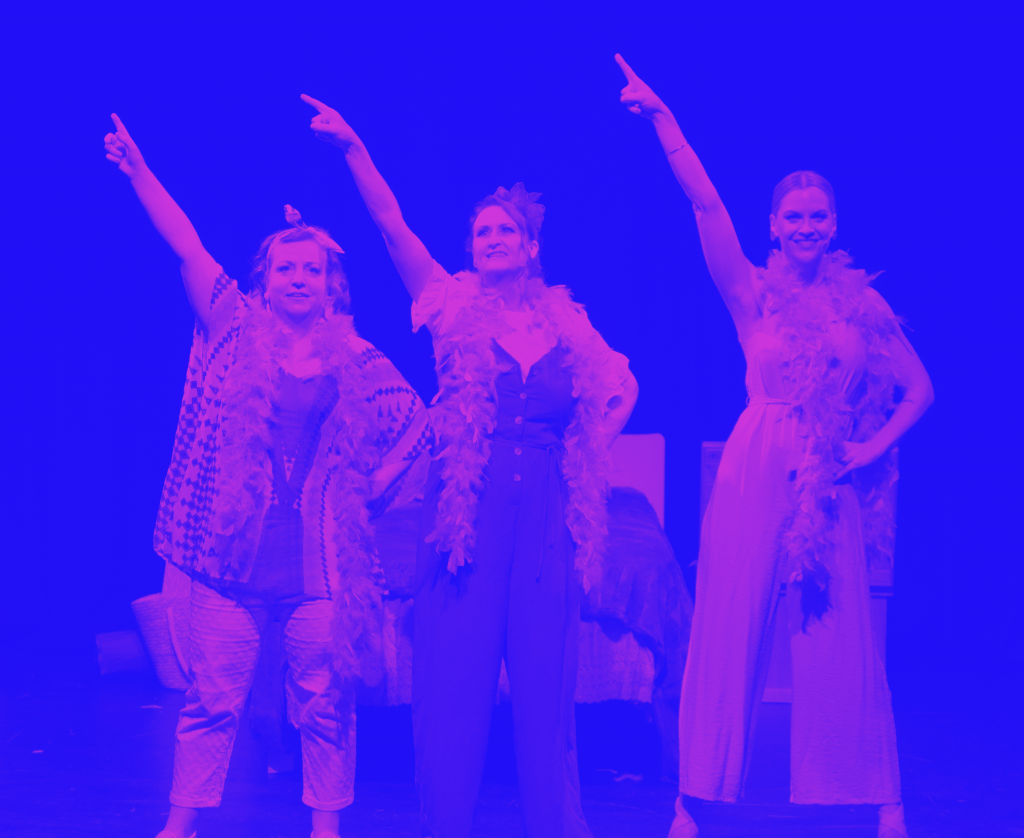
‘Mamma Mia’ // Redcliffe Musical Theatre
‘Mamma Mia’ was super (trouper).
Transforming Redcliffe Entertainment Centre into a beautiful Greek island, Redcliffe Musical Theatre (RMT) opened their production of ‘Mamma Mia!’ to an enthusiastic and excited audience.
‘Mamma Mia!’ is a classic jukebox musical composed by two members, Benny Andersson and Björn Ulvaeus, of the internationally beloved Swedish pop group, ABBA, with the book written by Catherine Johnson. The production originally premiered on London’s West End in 1999 before opening on Broadway in 2001. Since then, there have been productions and tours of ‘Mamma Mia!’ across the globe.
The storyline follows Sophie and her mother Donna as they prepare for Sophie’s wedding to her fiancé Sky. Sophie complicates things by inviting her three possible fathers – Bill, Harry, and Sam – to her wedding without anyone’s knowledge.
Lighting design by Chris Walker and Madeleine Johns was natural and fitting. The back wall of the theatre was lit in accordance with the time of day and the intensity of the lights on stage similarly reflected this. Spotlights were effectively implemented during ensemble scenes when particular characters needed to be highlighted , For example, in ‘Voulez Vous’, Sophie speaks to each of her potential fathers in a focal area, while the lights over the ensemble are dimmed.
A stunning and powerful use of the spotlight was during Donna’s solo, ‘The Winner Takes it All’. The entire stage was darkened and a single spot placed on Donna. This not only heightened the dramatic tension within the number but allowed the audience to clearly focus in on the action. Lights were also used to create a water ripple effect during the scenes on the jetty with a blue wash over the stage. Overall, the design used was very effective in portraying the place, time, mood and the focus within each scene or song.
Led by musical director, conductor and pianist, Helen Drew, the orchestra and cast, were amazing. The use of different instruments on the four keyboards was impressive and the orchestra’s synchronicity, for the most part, was excellent. Some moments fell slightly out of sync within the orchestra and ensemble, however, the orchestra’s ability to swiftly correct it made these moments pass practically unnoticed. The vocally impressive cast nailed the iconic ABBA harmonies, helping to build each number and creating dynamics within the lead’s solo songs.
The volume of the orchestra and cast was mostly balanced, however, at times, the orchestra overpowered the cast in the second act. This made it difficult to distinguish the leads during larger ensemble pieces. Some of the mics were off momentarily in a couple of scenes, but their projection ensured the lines were still heard.
Set design by Jonathan Johns and Chantelle Duke was simple and beautiful. The main set pieces consisted of a front-facing taverna in two parts – one of which had a staircase, some tables and chairs, and a cobble-looking platform with a few steps. The height of the taverna, the staircase, and the platform provided the ensemble with extra room and made the show feel more natural and realistic.
One of the contextualising features was the taverna, painted with the typical Grecian island white and blue and decorated with vines and flowers. Multi-coloured light bulbs were strung across the top and used in a couple of the party-related scenes. There was also a bar and ice cream cart which added to the feel of the island. A small jetty made multiple appearances and was enhanced by the lighting mimicking the ocean. The bedrooms were modestly conveyed with a bed, surrounded by a full length mirror, folding screen, desk, and a chest. Each of these pieces was used and doubled as storage for props. Johns, Duke and the rest of the set construction team should be commended for not only creating a functional but equally aesthetically pleasing set.
Each of the props served their purpose and were strategically chosen and designed. The stand out, which had the audience both laughing and cheering in awe, was a small boat that moved across the stage controlled by Cameron Egginton as Eddie in the driver’s seat; so to speak. The boat added so much to the lighter scenes of the musical and contributed to the physical comedy of Rosie (played by June Tretheway) at the beginning of the show.
While wardrobe choices from Sonja Andrews were all well-suited to the island climate and were appropriate for each scene, some were taken a step further and reflected the characters’ personalities. The ensemble was dressed in summer clothes for the majority of the musical, before the women changed into glittery party outfits for the bachelorette party and the men donned Hawaiian shirts for the bachelor celebrations . The matching costumes for Donna, Tanya, and Rosie’s performance of ‘Super Trouper’ were wonderfully reminiscent of the jumpsuits ABBA themselves wore. At the end of the musical, Bill, Harry, and Sam wowed audiences with their matching sparkling silver jumpsuits. The costumes for the lead and supporting characters were reflective of their personality and made them stand out with their own style.
Direction by Madeleine Johns was admirable for such a substantial production and cast. The use of space and blocking was effective and ensured that each person in the ensemble was given a moment to shine. The dialogue throughout was well-paced and the jokes consistently hit their mark.
Expressive and diverse choreography was presented to the credit of Meredith Johns and Giulia Bortolanza. Each number effectively melded with the music and suited the abilities of each cast member, allowing them to dance smoothly and keep in time. The choreography allowed the main focus to be placed on the leads while maintaining the pazazz that ‘Mamma Mia!’ is known for. A routine highlight was most definitely the flipper dance in ‘Lay All Your Love on Me’. The audience could not stop laughing at the exuberant performance, particularly from Cameron Egginton and Zachary Crisan as Eddie and Pepper respectively.
In the lead roles of Donna and Sophie were Meg Kiddle and Georgia Burnett. Kiddle captured Donna’s liveliness but also the scars from her past. Her strong and expressive voice lent itself to the iconic character and allowed Kiddle to explore an array of emotions. ‘The Winner Takes it All’ was particularly powerful, allowing Kiddle to display her fantastic acting and vocal abilities.
Burnett’s performance as Sophie was sweet and charming. Her voice was well-suited to the role and her chemistry with the other characters strengthened her interpretation. Her voice blended nicely when singing duets or smaller numbers with the supporting characters.
Melanie Fuller and June Tretheway as Tanya and Rosie respectively were well-cast and encapsulated their character’s vastly different personalities and equally endearing friendship. Fuller’s performance of ‘Does Your Mother Know’ was cheeky and entertaining and Tretheway similarly shone in her number ‘Take A Chance on Me’. Tretheway’s vocal performance and choreography had the audience in stitches.
James Reid (Bill), David O’Keeffe (Harry), and Charlie Harrison (Sam) were wildly entertaining as Sophie’s prospective dads. Each actor had a unique vocal timbre and distinct characterisation that effectively connected l with Kiddle and Burnett and with each other. Their voices carried well during duets and smaller numbers and their acting was strong.
Matt Leigh as Sky delivered a heartfelt and passionate performance. His acting and ability to form meaningful connections with Burnett, Egginton, and Crisan displayed the depth of Sky’s character. Leigh’s vocals in ‘Lay All Your Love on Me’ were bright and clear.
The featured characters of Ali, Lisa, Eddie, and Pepper were played by Tiani Rustam, Kaley Jones, Cameron Egginton, and Zachary Crisan respectively. Rustam and Jones portrayed their roles successfully and led the ensemble during larger numbers with confidence and triple threat abilities. Egginton and Crisan were the ‘class clowns’ of the cast, which perfectly embodied Eddie and Pepper’s character. Their acting and physicality captivated audiences and provided fantastic comedic relief. The remaining ensemble maintained fantastic energy, which certainly rubbed off on their audience who clapped along to the iconic tunes.
Redcliffe Musical Theatre’s production of ‘Mamma Mia!’ was full of heart and full of fun. This show provides a perfect evening out for ABBA fans, and will leave audiences with a huge smile on their face, boogying all the way home.
‘Mamma Mia’ returns to Redcliffe Entertainment Centre in July 2020. For information on tickets, visit Redcliffe Musical Theatre’s Website.
Photography by Abi Moss and supplied by Redcliffe Musical Theatre.




